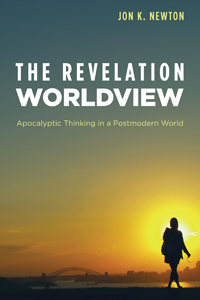
DARREN CRONSHAW finds Jon K Newton’s The Revelation Worldview a good way to re-engage with the Biblical book of Revelation…
Jon K Newton
The Revelation Worldview: Apocalyptic Thinking in a Postmodern World
Wipf & Stock, Eugene, Oregon, 2015
ISBN-13: 978-1-62564-769-6
 |
“One of the most valuable aspects of the book is Newton’s overview of the history of ideas, including how the Western world transitioned into modernity after the Enlightenment and then beyond it to a postmodern framework that questioned modernist faith in progress, privileging of science and faith in technology.” |
As a teenager I was intrigued by the book of Revelation and the end-times books that church friends urged me to read. I have not engaged John’s apocalyptic writing much since, until two things relit my interest.
Firstly, I visited Patmos in 2012 and spent a day reflecting on what it would have been like for John to be exiled there and to write a subversive letter about how churches can live out the Gospel in the context of Imperial domination. As we travelled then around Europe, I thought about how the church today communicates its message in an increasingly secular and post-secular context.
Secondly, I read Jon Newton’s fascinating analysis of the book in conversation with his analysis of postmodern thought and the development of the Western worldview, and grew freshly fascinated with revelation and its contemporary message, albeit without the overtones of the end of the world.
Jon Newton is dean of postgraduate studies and head of research at Harvest Bible College, where he has been teaching and writing on Revelation including completing a PhD from Deakin University Postmodernism, Christianity and the Book of Revelation (2006). The Revelation Worldview is a thoroughly rewritten version of his PhD, inspired by teaching from it for a Harvest masters class in Denmark in 2010.
One of the most valuable aspects of the book is Newton’s overview of the history of ideas, including how the Western world transitioned into modernity after the Enlightenment and then beyond it to a postmodern framework that questioned modernist faith in progress, privileging of science and faith in technology. He traces the variety of theological responses to postmodernism – from fundamentalist opposition to postliberal adaptions, and then zeroes in their commentary on Revelation. He deals with revelation’s teaching about the reality of the spiritual world; postmodern perspectives on revelation as a theological concept (especially the importance of recognising the situated context in which we interpret and apply Scripture); and the significance of personhood, individualism and gender and the place of humans in influencing history and working for justice and creation care. Moreover, he responds to postmodernism’s “incredulity towards metanarratives” by asserting the priority of the Biblical story and its hope for the future. His overview is thoroughly researched, with detailed critiques of the scholarship but written in a way that is generally accessible.
Two insights stood out for me from Newton’s book and the fresh reading of Revelation he points towards. Firstly, understanding the spiritual world is important not just for reading Revelation but for understanding the worldview of many cultures in the world, especially in the global south where Christianity is experiencing its most remarkable growth. Newton suggests that Revelation as a book, and Pentecostalism as a movement, a much to teach us in the Western world and our postmodern times.
Newton is not a one-eyed Pentecostal supporter though, and speaks both appreciatively and prophetically about his own movement: “Pentecostalism may then be the form of contemporary Christianity most able to express the insights I have discerned in Revelation and speak to the needs of the postmodern world, though its attitude to postmodernism is ambivalent, and it is in constant danger of slipping into a fundamentalist, rejectionist type of reaction that will make it less relevant to our times.” Newton has whet my appetite for reading and learning more Pentecostal theology.
The second insight Newton helped me to grasp is about the underlying Biblical story that is reflected and culminated in Revelation. Revelation shows the priority. Revelation presents Jesus is the “messianic governor of history” who brings history to a climax. One metanarrative theme in Revelation is of an epic war story, obvious in the battle imagery. But Newton also focuses on exploring the intriguing suggestion that Revelation is a love story in the genre of ancient love stories. This helpfully reminds readers that love not war is the ultimate objective of God’s story: “John, writing in a period that also experienced overwhelming violence and tragedy, recalls a narrative that could face the evil, explain it, and still see a love story at work through history, thus providing a solid basis for confidence towards the future, especially in the light of redemptive meaning of the death/resurrection of Jesus.”
There is also an implicit anti-imperial message of resistance, subverting the claims of Imperial Rome as well as addressing the challenges of a pluralist multi-religious society that John and the churches lived in, reflected no less in the world we live in today. Ultimately, Jon Newton shows how John the writer of Revelation models for us apologetically upholding the story of Christ as the fulfilment of all other stories and history.
The Revelation Worldview is a valuable addition to bibliographies for students and teachers of Revelation, but also those interested more broadly in biblical studies and hermeneutics, and the history of ideas and historical theology.
This review was originally published in Australian eJournal of Theology 22:2 (2015), pp. 142-143, accessible at http://aejt.com.au/2015/volume_22/vol_22_no_2_2015/?article=773411
Follow this link to buy this book – The Revelation Worldview: Apocalyptic Thinking in a Postmodern World.





